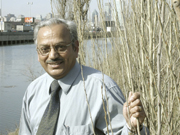|
by James Martin
Dr. Bala Ashtakala isn’t just a professor of transportation
engineering, he’s a bona fide media darling. In the past, he’s
turned the spotlight on the city’s pothole problem. Now he’s
worked up over water.
Over the last five years, Ashtakala has become the Montreal media’s
go-to guy for matters concerning the city’s crumbling infrastructure.
Nicknamed “Professor Pothole” for his high-profile commentary
on those springtime road hazards, Ashtakala has posed for photos standing
between lanes of speeding cars, appeared on countless radio and TV interview
programs, and written articles for newspapers as far away as the Netherlands.
When he presented a paper at an engineering conference in Regina, his
reputation preceded him and he was mobbed by local reporters eager to
talk potholes.
Ashtakala uses his media appearances not only to call attention to what
he believes are pressing concerns, but also to inject real-world relevance
into theoretical classroom discussions.
The pothole issue, for example, is perfect fodder for his undergraduate
Highway & Pavement Design course, opening up discussion about why
some potholes are inevitable (regular surface wear and tear, moisture
seepage), and how they can be minimized (increase frequency of regular
surface upkeep, use better building materials).
Now, following a low-snow winter (and therefore a low-pothole spring),
Professor Pothole is focusing his attentions even lower.
Ashtakala’s current pet peeve/project is Montreal’s decrepit
underground water system.
“We’ve got a big problem in Montreal with overall urban infrastructure
renewal,” he said, “but the water supply and sewer system are
the worst problems right now.”
The problem has been brewing for a while. He recalls being called to the
scene of a massive Old Montreal pipe burst in October 2000, where he was
astonished to learn that some of the city’s pipes may be as much
a century old. Most of the system is somewhere in the neighbourhood of
40 years old — but even that, says Ashtakala, is too old.
“The pipes have all corroded,” he reports. “They’re
full of holes, like a sieve. Now they’re losing 40 per cent of the
good, treated water. It’s just going out through the holes! You spend
a lot of money to treat, say, 100 litres of water — and 40 litres
is just going down the drain. It’s a waste of money.”
Repairing pipes is merely a band-aid measure, he says. The city’s
recently announced plan to spend $1.6 billion overhauling the system is
a step in the right direction. He takes issue, however, with the proposed
20-year timeframe.
“That’s no good. You need those replacements right away. Granted,
you can’t do it all tomorrow, but you also can’t do it over
20 years. The leaks will continue, and we’ll keep losing water.”
His grievance list doesn’t just stop with potholes and water —
there’s also the city’s decaying overpasses, and the issue of
rerouting large trucks carrying hazardous materials, and more — but
Ashtakala says he’s content to maintain his distance from the political
machine.
“I have a feeling that people take notice of what I’m saying,”
he said, noting that the current water system renewal project came after
his comments regarding the chaotic October 2000 burst. “I shouldn’t
take credit for everything, but once you bring attention to these issues,
people take a second look. This kind of attention is needed to help fix
these problems.
“I’m a teaching professor. I have no interest in meddling in
politics. My responsibility is to educate, and to let other people take
up the issue.
“I don’t want people thinking my opinions are based on politics
— I go by facts and figures. When I say something, it’s out
of conviction.”
|




